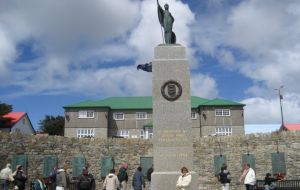MercoPress. South Atlantic News Agency
The Falklands people decision in March should be the final word
 Liberation Monument in Stanley which honours those fallen in the recovery of the Falklands 14 June 1982
Liberation Monument in Stanley which honours those fallen in the recovery of the Falklands 14 June 1982 One of the leading New Zealand newspapers, The Dominion Post, has addressed the issue of the Falklands, the dispute with Argentina and the coming March referendum in an editorial “Islanders should decide their destiny”, which we kindly reproduce.
In March, Falkland Islanders will vote in a referendum asking whether they want to retain their status as an overseas territory of the United Kingdom. It is expected that every single one of them will say yes.
If so, Argentina should respect their wishes. It should be for the Island's 3100 residents to determine their political and sovereign status, no-one else.
The sabre-rattling in recent weeks over the Falklands has stirred memories of the bloody war fought over two months after Argentina invaded and occupied them in April 1982. More than 250 British servicemen, about 650 Argentines and three Islanders died before Britain regained control.
The world has, of course, changed markedly since then. In 1982, Argentina was ruled by a brutal military junta, and the decision to invade the Malvinas, as the Argentines know the islands, was primarily motivated by the desire to distract attention from rampant inflation and economic decline at home.
There is no reason to believe Argentine President Cristina Fernandez is considering anything so drastic. Argentina does not want another war over the Islands any more than Britain.
However, reports last week that Britain is planning a military show of force in the Falklands before the referendum highlight the tension the centuries-long dispute over sovereignty still stirs. There is a risk that any confrontation could quickly escalate.
Britain's main concern is reportedly that Buenos Aires could stage an aggressive stunt, such as sending a small party to plant an Argentine flag on Falklands soil if, as expected, there is a 100 per cent vote to remain an overseas territory of the UK. There are also concerns Argentina's navy could harass the Falklands fishing fleet and disrupt British oil and gas exploration.
Should any of those come to pass, there is a danger of unwanted conflict. It is a time for cool heads to prevail.
Both Argentina and Britain advance strong arguments to support their claims to the Falklands.
Buenos Aires says that Spain won recognition to the Malvinas in 1767 and sovereignty passed to Argentina when it became independent, which occurred before the British settled the Islands. It also insists that Britain's claim to land 14,000 kilometres from London cannot be sustained.
For its part, Britain points to the fact that the first known landing on the uninhabited Falklands was made by a British naval captain in 1690. It also says the Spanish abandoned the islands in 1811, and there were no inhabitants or form of government till the British settlement began 22 years later.
The strongest argument is that the principles of self-determination dictate that those who live on the Islands should decide how they are governed.
The historical complexity of the claims and counter claims and the uncertainty over who would win if the issue ever went to court makes it highly unlikely the Falklands’ dispute will ever be resolved to both sides' satisfaction.
The people best placed to determine the Falklands' destiny are those who have made their homes there. Their decision in March should be the final word.





Top Comments
Disclaimer & comment rules-

-

-

Read all commentsThe people best placed to determine the Falklands' destiny are those who have made their homes there. Their decision in March should be the final word.
Jan 22nd, 2013 - 08:05 pm 0Amen!
Of course it should be,- Thanks Kiwi's.
Jan 22nd, 2013 - 08:11 pm 0Well done New Zealand.
Jan 22nd, 2013 - 08:12 pm 0Ordinarily you would think this was so obvious it didn't need saying, but evidently not.
Commenting for this story is now closed.
If you have a Facebook account, become a fan and comment on our Facebook Page!